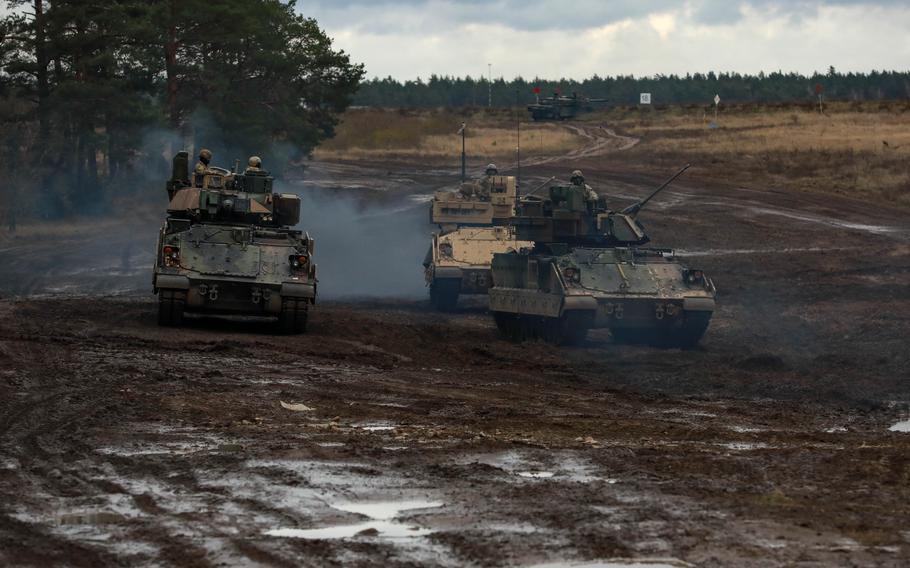
Army M2A3 Bradley Fighting Vehicles assigned to the 1st Cavalry Division participate in the Tumak 24 exercise at Bemowo Piskie Training Area, Poland, Nov. 20, 2024. The annual Reagan National Defense Survey revealed a 15 percentage point increase in American support for increased military spending. (Trevor Wilson/U.S. Army)
Americans support increased military spending even while many overestimate how much is already being spent, according to an annual survey that also found broad support for U.S. leadership in world affairs.
The findings of the Reagan National Defense Survey show rising confidence in the military after years of decline, though public opinion remains divided on key issues, including military aid to Ukraine and Israel.
The survey, sponsored by the Ronald Reagan Institute, a conservative think tank, polled 2,510 Americans after last month’s presidential election.
It revealed a growing belief in the need for U.S. global engagement, with 57% of respondents favoring a more active leadership role in international affairs — up 15 percentage points from last year.
“Americans who cast their votes for different candidates share an unshakable core set of beliefs: the United States must lead on the world stage, backed by a strong military that can secure the peace through its strength,” the report said.
Nearly 8 in 10 Americans support increased military spending, according to the survey, which found that 89% of President-elect Donald Trump’s voters shared this sentiment. The level of support for military spending was the highest recorded in the survey’s seven-year history.
This support was particularly notable given that many respondents overestimated current defense spending.
Over 30% of those questioned thought the U.S. spent somewhere between one-quarter and one-half of the federal budget to defend itself, and 16% believed the amount was more than half of the budget.
In fact, 13% of 2024 federal spending was allocated for defense, according to data from the Office of Management and Budget.
The survey didn’t ask respondents how the U.S. should fund a boost in defense spending.
However, it did reveal concerns about the impact of the national debt on the country’s ability to defend itself, with 69% of respondents expressing fears that rising debt could force cuts to the defense budget.
The U.S. budget deficit grew to over $1.8 trillion for fiscal year 2024, the highest outside of the pandemic era, as interest on the federal debt exceeded $1 trillion for the first time.
Meanwhile, public confidence in the military has risen, with 51% of respondents expressing a great deal of trust, up 5 percentage points from last year. Also, 31% said they had some trust and confidence in the U.S. military.
The figure is still well below the 70% recorded in 2018 who said they had a great deal of trust in the armed forces.
The military’s ability to handle global threats remains a concern for many Americans. Polling showed that 52% believe the U.S. would win a war against China, compared with 64% who are confident in a potential conflict with Russia.
A majority, 61%, also believe the military should be large enough to fight two wars simultaneously.
The survey highlighted partisan divisions over U.S. military aid to Ukraine. While 55% of Americans overall support sending weapons to the beleaguered country, this includes 74% of voters for Vice President Kamala Harris and just 42% of Trump voters.
A majority, 59%, across party lines favor a negotiated settlement to end the war, even if it requires Ukraine to concede territory to Russia.
Regarding the Middle East, 61% of respondents said freeing American hostages held by Hamas should be a top priority.
Support for military aid to Israel stands at 54%, with significant partisan differences: 67% of Trump voters back such aid compared with 46% of Harris voters. Americans are evenly divided on whether Israel should continue military operations in Gaza or pursue a cease-fire.
The survey also found bipartisan support for maintaining U.S. military bases worldwide, with 62% of respondents agreeing they are essential for deterrence and rapid response.
The U.S. military’s presence was seen as most important in the Asia-Pacific, followed by the Middle East and then Europe to confront threats from China, Russia and other adversaries.
The Institute selected Beacon Research and Shaw & Co. to conduct the survey, which was carried out from Nov. 8 to Nov. 14, through a mix of telephone and online interviews.